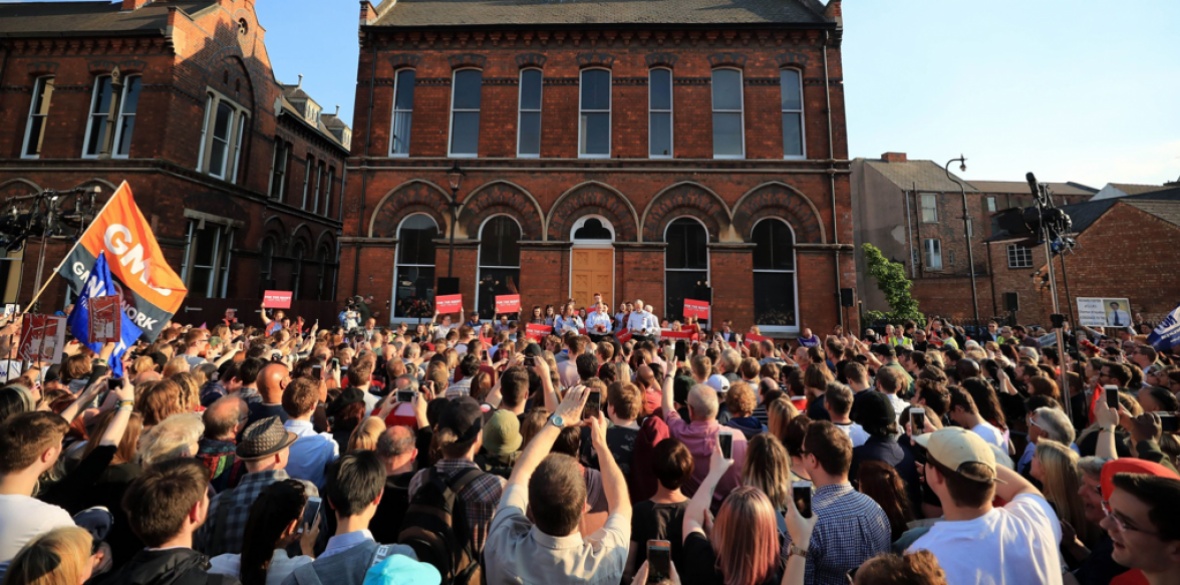This is the last article you can read this month
You can read more article this month
You can read more articles this month
Sorry your limit is up for this month
Reset on:
Please help support the Morning Star by subscribing here
HOW many union members expected to live to see the day when a Labour leader would tell a union conference he is “proud” to have been a lifelong trade unionist and will die so?
Jeremy Corbyn’s address to the Communication Workers Union (CWU) conference in Bournemouth confirmed that the labour movement choice to back a socialist as Labour leader was the correct one.
Bakers’ union BFAWU leader Ronnie Draper evokes in a Morning Star interview tomorrow the dark days for trade unionists when Tony Blair was prime minister.
“People didn’t see any distinction between what Labour did and what the Tories did. It was tough to have people in your own party stabbing you in the back,” he recalls.
Too many trade unionists were passive at that time, believing that the best to expect was a choice between Blair and the Tories and concluding that any Labour government would always be better than them.
Damned by faint praise is probably the most apt comment.
Blair’s government brought in a minimum wage but pitched it far too low, setting an example in “moderation” for his successors so the Tories were able to trump this advance with their misnamed “national living wage.”
Yes, New Labour administrations had some feathers in their caps, including the Northern Ireland peace agreement, devolution to Scotland, Wales and London, higher NHS and education spending and progress in the equalities agenda, but these were all partial or inadequate.
Organised labour was left with, in Blair’s own words, “the most restrictive union laws in the Western world,” while infrastructure renewal depended on ruinous private finance initiative (PFI) deals that allowed the private sector to milk the public purse.
Not only did Blair and company fail to return privatised public assets to common ownership but they pressed ahead with further privatisations that not even the Tories had dared to attempt.
They continued Margaret Thatcher and John Major’s hostility to council housing, building few and handing over entire estates to the private sector while encouraging the sale of council houses to sitting tenants.
Above all, New Labour pursued an imperialist foreign policy, acting as cheerleader and US partner in crime in disastrous wars, the most criminal and blood-soaked being Iraq.
Corbyn and a small number of back-bench colleagues spoke out against all of these misplaced and even criminal policies, winning a reputation for principle that drew hundreds of thousands of people into the Labour Party.
CWU delegates in Bournemouth will know better than anyone that, when Peter Mandelson sought to privatise Royal Mail — before the Tories and Liberal Democrats achieved it — Corbyn stood alongside their union in opposition.
Privatisation, in common with PFI and public-private partnerships, is a mechanism for transforming public assets into private wealth.
As Corbyn told CWU delegates, private shareholders received £37 billion in dividends paid out by formerly public corporations in the past eight years, which puts into context the commonly heard whine about proposals to improve life for workers, pensioners, claimants, the disabled, NHS, education or the care sector — “Where’s the money to come from?”
There is money in abundance in Britain. It’s just in too few hands, and the wrong ones at that.
CWU general secretary Dave Ward’s reminder to his members that it is “our job” to ensure that Corbyn is our next prime minister should be heard throughout the labour movement.
It is the job of all trade unionists to work to put someone in Downing Street whose loyalty is to our class not to the City of London.











